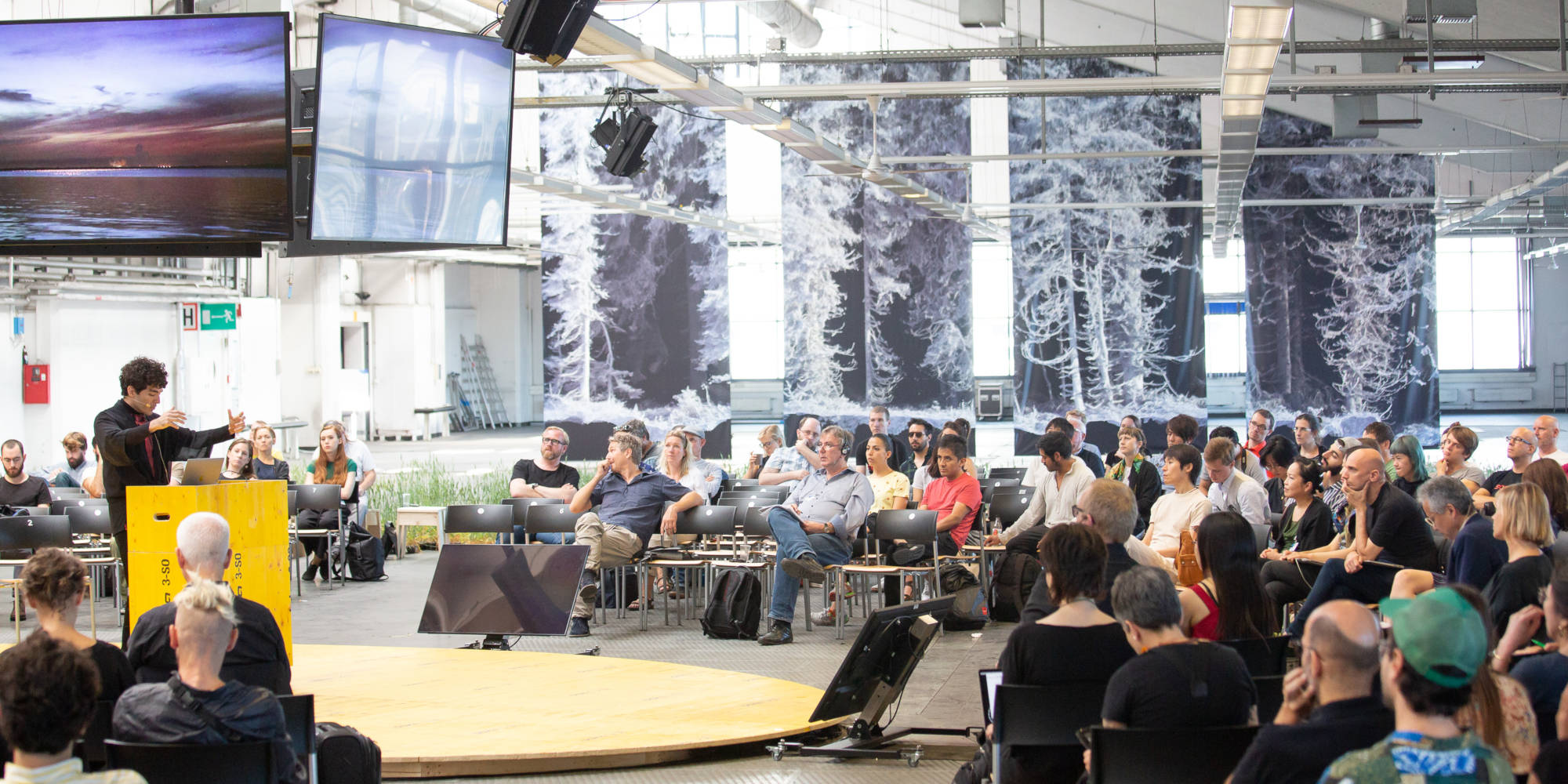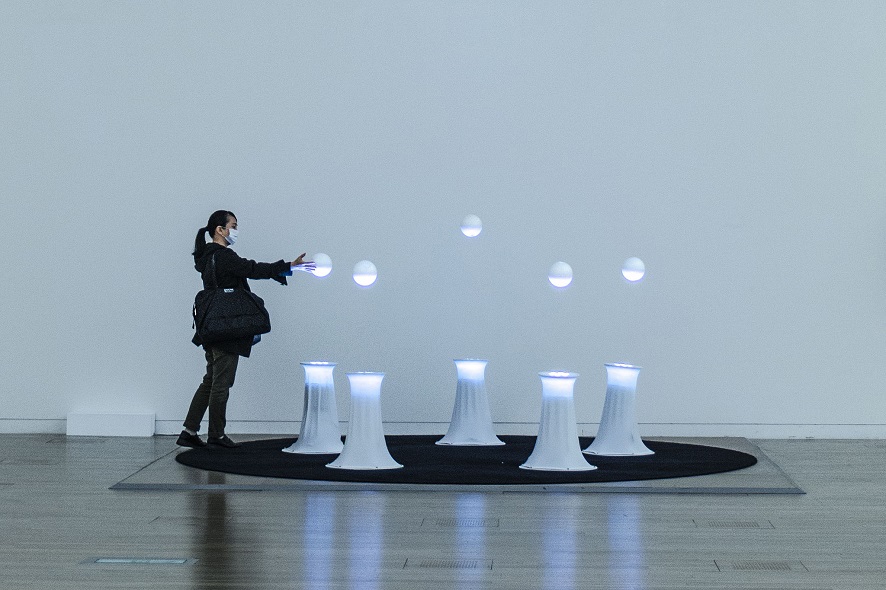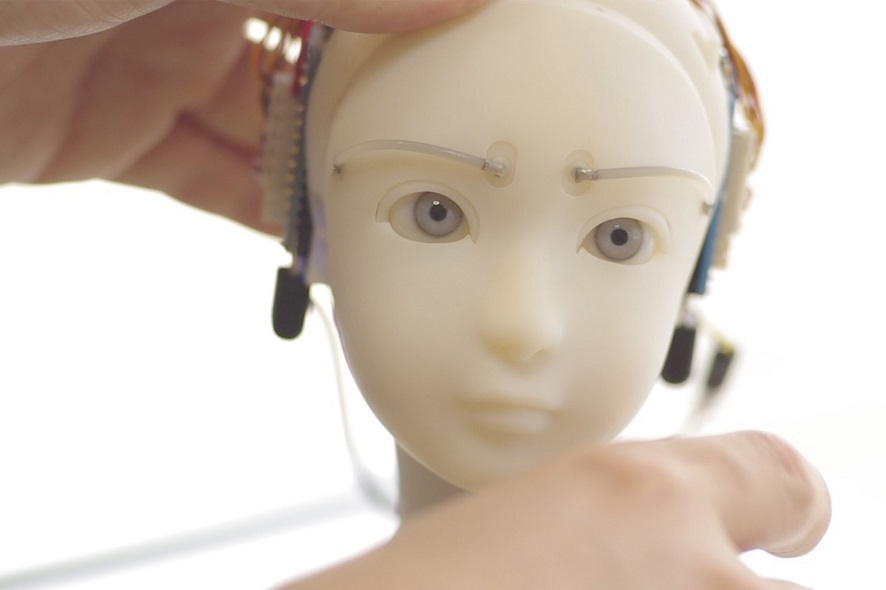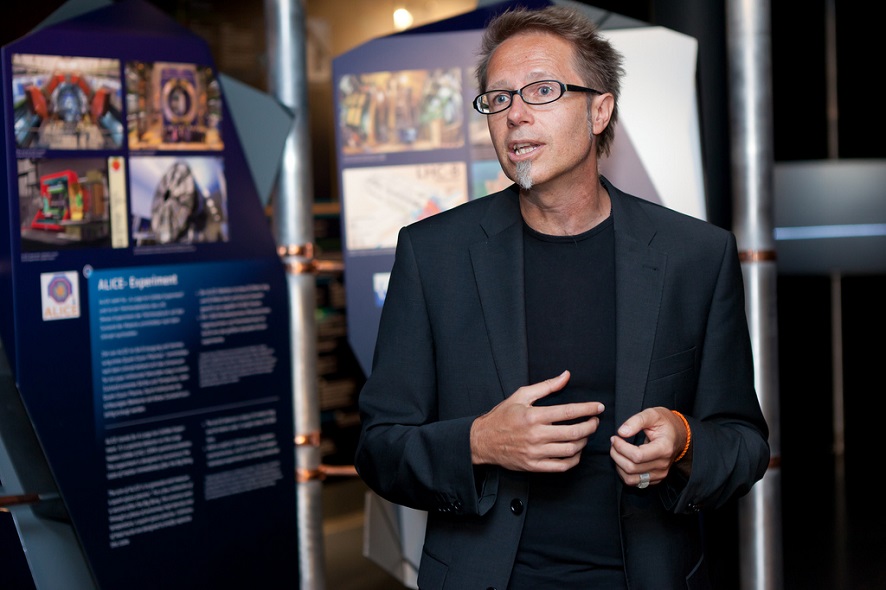This year’s ERROR – The Art of Imperfection conferences will spotlight the topic from different perspectives. Starting from a meta level discourse on the phenomenology of erring it leads through valiant approaches of conquering new risks and ends on sunday with very self reflective perspectives on erring in various disciplines and practical fields.
| FR Sept. 7, 2018: 10 AM – 12 noon | The Fragile |
| FR Sept. 7, 2018: 12 noon – 1 PM | Embracing the Risk: STARTS Talks |
| FR Sept. 7, 2018: 2 PM – 3:30 PM | Fakes, Responsibilities and Strategies |
| FR Sept. 7, 2018: 3:30 PM – 5:30 PM | AI in Art & Science, Strategy for responsible Innovation |
| SUN Sept. 9, 2018: 10:30 AM – 12:30 noon | Academy of Error |
| SUN Sept. 9, 2018: 1 PM – 3 PM | Space Art – Trial and Error in Art & Science |
| SUN Sept. 9, 2018: 3:15 PM – 5 PM | Deep Fake or Rendering the Truth |
The Fragile
FRI September 7, 2018, 10 AM
Errors are imperfections, deviations from the norm, not conscious failures or mistakes. Imperfection is an important creative and poetic force that also fosters social and technical innovation. In our longing to manage the imperfections of ourselves and our surroundings we invented all kinds of mind and body extensions. To expand our reach our ancestors thought of complicated steering mechanisms for seafaring, optic devices helped us study our solar system, and soon privatized space travel aims to colonize other planets to ensure humanity’s survival. We have learned to include errors in our thinking to make substantial progress in social innovation as well as technical and industrial developments. Still, humanity remains a fragile construct.
| 10 AM – 10:20 AM | Gerfried Stocker (AT) Welcome Address |
| 10:20 AM – 10:40 AM | Anna Echterhölter (DE) and Andreas Wolfsteiner (DE) Avoidable Delay. Measuring Error in Practices |
| 10:40 AM – 11 AM | Nathan H. Lents (US) Human Errors: Evolutionary Glitches in the Human Body |
| 11 AM – 11:20 AM | Meredith Broussard (US) Artificial Intelligence Doesn’t Do As Much As You Think: Errors in Concepts of AI |
| 11:20 AM – 11:40 AM | Discussion |
Moderation: Barbara von Rechbach (AT)
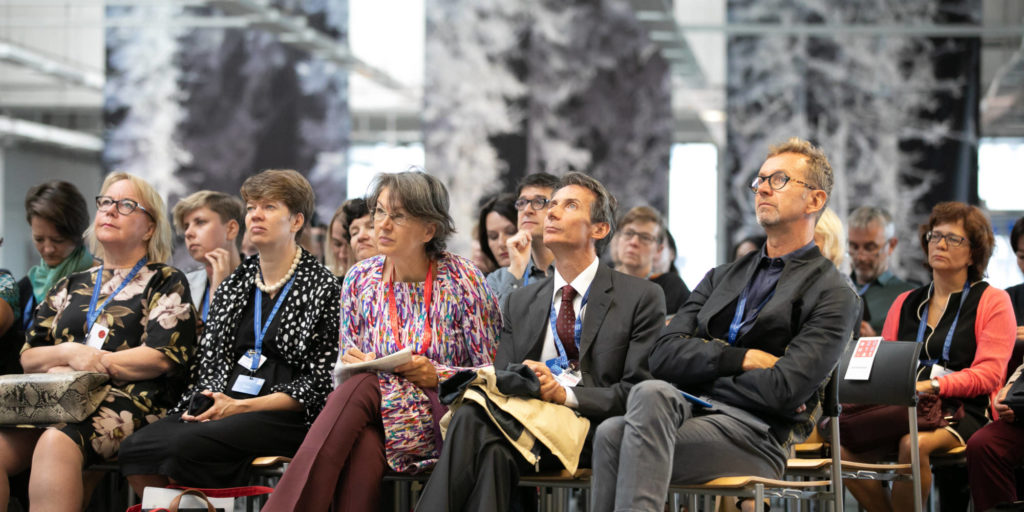
Livestream FRI September 7, 2018, 10 AM – 1 PM
Embracing the Risk: STARTS Talks
FRI September 7, 2018, 12 noon
Luckily for us, there are those that defy our fragility and dive head-on into taking risks. Pioneers of human innovation embrace the dangers of committing grave errors to imagine and eventually realize complex projects, like having robots plot out steel bridges on the go or engineering an over-the-counter kit for home made custom remedies for vaginal health. „Embracing the Risk“ presents two projects that were only possible through daring boldness and the willingness to commit grave errors and were rewarded with the STARTS Prize‘18.
| 12:05 noon – 12:20 noon | Tim Geurtjens (NL) Amsterdams’ 3D Printed Steel Bridge |
| 12:20 noon – 12:35 noon | Giulia Tomasello (IT) Future Flora |
| 12:35 noon – 12:45 noon | Sophie Lamparter (CH) and Alexander Mankowsky (DE) STARTS Prize 2018 Selection |
| 12:45 noon – 1 PM | Discussion |
Moderation: Barbara von Rechbach (AT)
Fakes, Responsibilities and Strategies
FRI September 7, 2018, 2 PM
Apart from randomly occurring errors, we have been experiencing intentional man-made deviationsthat are using current technology to produce lifelike deep fake videos and spread misinformation in digital media. In a mediascape where the average user couldn’t care less about the veracity of sources, who is responsible for regulating the distinction between true and false? It seems that the next big leap in dealing with our errors needs to advance from delegating problem solving to artificial intelligence or official entities towards developing and promoting a sophisticated social intelligence and ethical responsibility.
| 2 PM – 2:20 PM | Regina Rini (US/CA) Everyone is Wrong on the Internet – Saving democratic debate from social media |
| 2:20 PM – 2:40 PM | Ernst Hafen (CH) Data to the People – The Path Away from Digital Feudalism |
| 2:40 PM – 3 PM | Ariana Dongus (DE) The Camp as Labo(u)ratory |
| 3 PM – 3:20 PM | Discussion |
Moderation: Derrick de Kerckhove (CA)
Livestream FRI September 7, 2018, 2 PM – 5:30 PM
AI in Art & Science, Strategy for responsible Innovation
FRI September 7, 2018, 3:30 PM
The afore-mentioned responsibility encompasses the encouragement of creative practices, as well as an openness for polymaths and cross-disciplinary approaches. There is a strong expectation that art-science-technology collaborations provide a valuable strategy for developing new and before unknown approaches by embracing errors and encouraging diversity, which allows a reflection on itself and its impact on society. These reflexions are essential for the creation of functioning human-machine interfaces in the further development steps of artificial intelligence.
| 3:30 PM – 3:40 PM | Roberto Viola (IT) |
| 3:40 PM – 3:55 PM | Beth Singler (UK) The Fractured Mirror: Reflecting on Artificial Intelligence and Us |
| 3:55 PM – 4:10 PM | Derrick de Kerckhove (CE) Algorithmethics |
| 4:10 PM – 4:25 PM | Chris Salter (CA) When are we? Adventures in the Machine Readable Self |
| 4:25 PM – 4:40 PM | Sputniko! (JP) Designing New Mythologies |
| 4:40 PM – 4:55 PM | Anna Maria Brunnhofer (AT) Creative AI Landscape – a critical review of current expectations |
| 4:55 PM – 5:10 PM | Pierre Barreau (FR) Composing the music of the future with Artificial Intelligence |
| 5:10 PM – 5:30 PM | Mark Coeckelbergh (BE/AT) Concluding Remarks and Discussion |
Moderation: Mark Coeckelbergh (BE/AT)
Chair: Roberto Viola (IT)
Academy of ERROR
SUN September 9, 2018, 10:30 AM
The Academy of Error sets the counterweight to Friday’s Error conference. It is a celebration of errors, mistakes, and failures. It seeks to reveal the potential that lies in committing errors, turning the unexpected experience of failing into a productive and constructive part of our processes. It shifts the reflection on the act of erring from an outward perspective to a more personal level. Professionals from different fields of science will give insight into the handling of errors in their respective disciplines.
Chair: Michael Doser (AT/CH)
Speakers: Hiroshi Ishii (JP/US), Matthew Fuller (GB), Ulrike Felt (AT), Eveline Wandl-Vogt (AT), Jim Gimzewski (GB/US)
Livestream SUN Sept. 9., 2018, 10:30 AM – 12:30 noon
Space Art – Trial and Error in Art & Science
SUN September 9, 2018, 1 PM
There is art where the error can be an integral part of creation, and there is space travelling, where a minor error could end deadly – at first glance, it almost seems impossible to combine these two. Yet, exploring is a vital part of both domains: searching for the formerly unknown or unconscious or, at least, looking at the dark corners of our universe. Maybe this is one facet of why space travel and art have crossed paths before and their combination sparks the interest of researchers, scientists and artists.
Speakers: Chris Welch (GB), Horst Hörtner (AT), Eric Dahlstrom (US/NZ), Nahum (MX/DE), Miha Turšič (SI/NL), Xin Liu (CN/US), Yuri Tanaka (JP/CH)
Moderation: Hiroshi Ishii (JP/US)
https://www.youtube.com/watch?v=JUY71EftEcY
Deep Fake or Rendering the Truth
SUN September 9, 2018, 3:15 PM
The ability of computers to fake reality convincingly is going to become more and more of a critical problem as hackers, extremist news organisations and politicians seek to control the media narrative through increasingly convincing visuals. This panel, co-organized with Tobias Revell, Natalie Kane and the Impakt Festival Utrecht, will consider and speculate on possible futures for rendered realities and suggest strategies for regulating or countering artificial realities created by computation.
Moderator: Arjon Dunnewind (NL)
Speakers: Tobias Revell (UK), Eliot Higgins (UK), Foundland Collective: Lauren Alexander (ZA/NL), Leonhard Lass (AT), Simone C. Niquille (CH/NL), Eveline Wandl-Vogt (AT)
Co-funded by Creative Industries Fund NL.
Livestream SUN Sept. 9., 2018, 1 PM – 5 PM
Biograhies
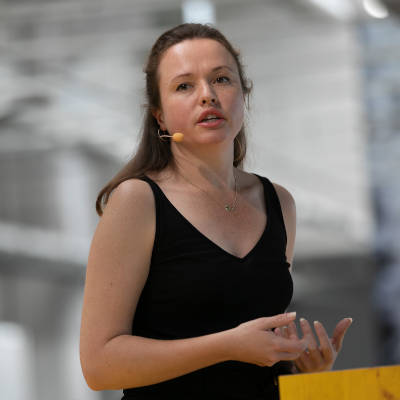
Lauren Alexander (ZA/NL)
Lauren Alexander, part of Foundland Collective: A collection of social media evidence related to the conflict in Syria, focussing on variable interpretations of media and generally assumed “truth” being dependent on context, framing and intention. By delving into material evidence from the 2018 “chemical weapon attacks”, Foundland uses subjective methods of analysis to slow down specific key images and details and allow for critical reflection.
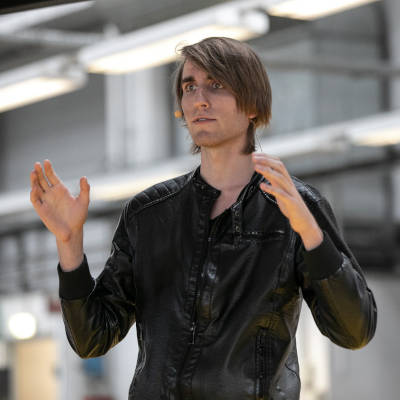
Pierre Barreau (FR)
Pierre Barreau is co-founder and CEO of AIVA, the Artificial Intelligence composing emotional soundtrack music. As a computer scientist, award nominated director and composer, he leads the company towards its vision of establishing AIVA as one of the greatest composers of all time, and fuelling the world with personalised music.
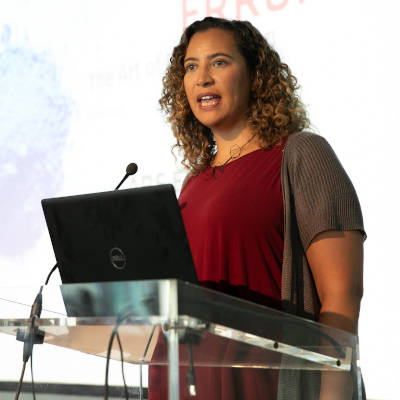
Meredith Broussard (US)
Meredith Broussard is an assistant professor at the Arthur L. Carter Journalism Institute of New York University and the author of “Artificial Unintelligence: How Computers Misunderstand the World.” Her current research focuses on artificial intelligence in investigative reporting, with a particular interest in using data analysis for social good. A former features editor at the Philadelphia Inquirer, she has also worked a software developer at AT&T Bell Labs and the MIT Media Lab. Her features and essays have appeared in The Atlantic, Harper’s, Slate, and other outlets. She holds a BA from Harvard University and an MFA from Columbia University.
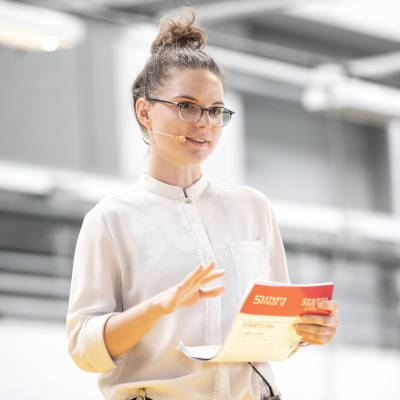
Anna Maria Brunnhofer (AT)
Anna Maria Brunnhofer works at the interface of business and creativity in strategy and experience consulting. Her focus is on contemporary technologies and their potential to change existing structures. With her broad background in economics and ethics, fashion design, art studies, and philosophy, her holistic approach to physical and digital matters is a particular strength.
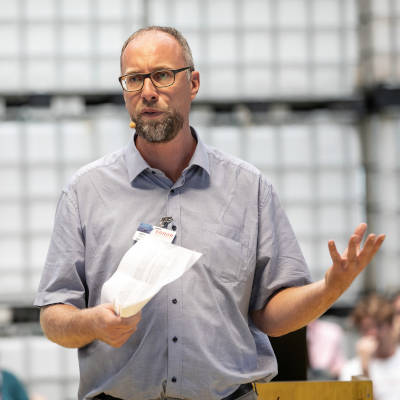
Mark Coeckelbergh (BE/AT)
Mark Coeckelbergh is Professor of Philosophy of Technology and Media at the University of Vienna, Austria, and President of the international Society for Philosophy and Technology. He is also member of the High Level Expert Group on Artificial Intelligence, European Commission, and the Robotics Council of the Austrian government. He is the author of 9 books and numerous publications. He is the author of 9 books and numerous article publications. His specialization is ethics of new and emerging digital technologies, in particular robotics and artificial intelligence. He contributes to international and national policy making in these areas, and is interested in connections between technology, art, and philosophy.
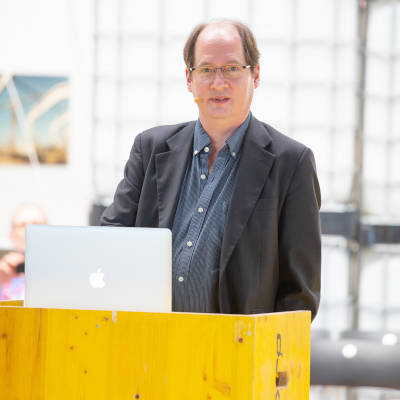
Eric Dahlstrom (US/NZ)
Eric Dahlstrom is a co-founder of SpaceBase and International Space Consultants, and an Edmund Hillary Fellow. Eric is a space engineer, astronomer, and consultant who has worked on spacecraft design, space science, and project management for 35 years, both for NASA and the commercial space industry. Eric worked on the design of the International Space Station and studied the risk of Shuttle accidents for NASA. He studied physics, astronomy, and space systems engineering and is currently the chair of Space Science at International Space University, having taught in ten countries. Eric worked on the design of the International Space Station including the Russian interface. He co-authored NASA’s “Lessons Learned from Challenger” report and the risk of Shuttle accidents. He has supported a dozen entrepreneurial space companies, served as project manager for commercial lunar spacecraft and payloads, and managed team projects at Singularity University. He is a planetary sciences mentor for the NASA Frontier Development Lab, applying artificial intelligence to the hazard of asteroid impact.
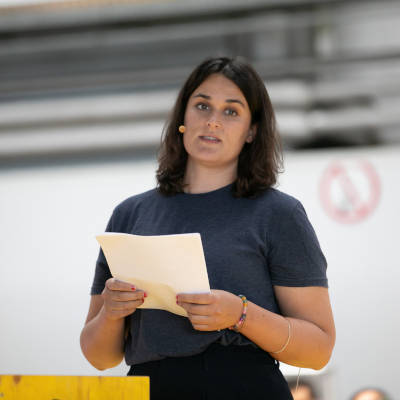
Ariana Dongus (DE)
Ariana Dongus is a researcher and writer based in Berlin. In exploring the intersection of biometrics, colonial pasts, new forms of work and machine intelligence, she contributes to a critique of today’s digital economies. Her recent publications include journalistic reports and essays as well as film and photography. She is a PhD candidate at Hochschule für Gestaltung Karlsruhe where she is a member of KIM, a research group for critical studies in machine intelligence.
kim.hfg-karlsruhe.de
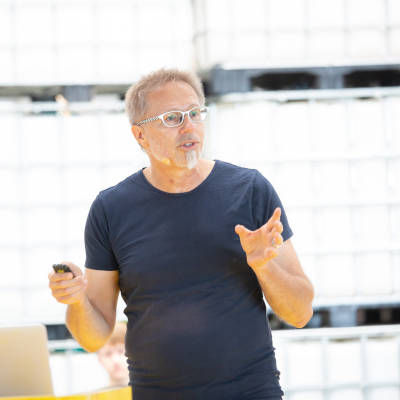
Michael Doser (AT/CH)
Michael Doser is a research physicist at CERN, the European Center for Nuclear Research in Geneva, Switzerland, who has specialized in working with antimatter, using it either as a tool (to study the strong interaction), or as an object of study itself (formation of anti-atoms, study of matter-antimatter asymmetry, measurement of the gravitational interaction between matter and antimatter) and is the spokesperson of the AEgIS experiment at CERN. In addition, he lectures on antimatter, and is editor of Physics Letters B and of the Review of Particle Properties. He is also involved in numerous outreach activities, both locally and internationally (Europe, Asia, USA), speaking to a wide spectrum of non-specialist audiences, from school children to decision makers, often also at art-related events.
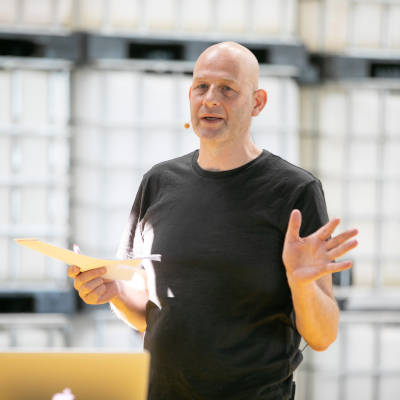
Arjon Dunnewind (NL)
Arjon Dunnewind; media art fanatic. Enjoys constructive controversy. Sees art as the early warning mechanism that our current media-driven society needs. Founder and director of the Impakt Festival, The Netherlands.
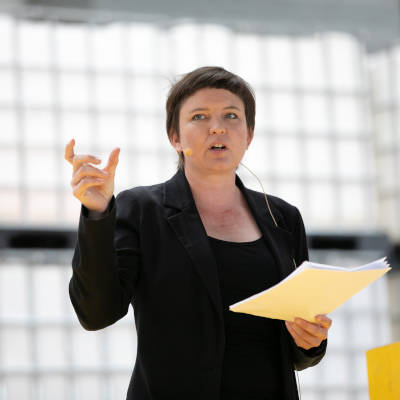
Anna Echterhölter (DE)
Anna Echterhölter is Professor of history of science at the University of Vienna. Prior to her appointment in spring 2018, she taught history of science at Technical University Berlin and culture studies at Humboldt University in Berlin, where she earned her PhD in 2009. She has held fellowships at the Max Planck Institute for the History of Science in Berlin, the German Historical Institute in Washington DC, and Goldsmiths College, London. Echterhölter is a co-founder of ilinx-magazine. Her current work is on metrology, chronology, and new monetary infrastructures. Especially, she is interested in the potentials of imprecise measurements, colonial mesuroclasm and the errors of classification.

Ulrike Felt (AT)
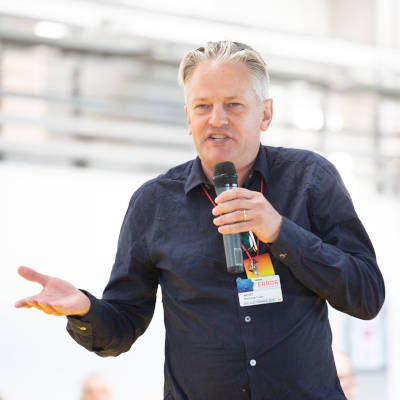
Matthew Fuller (UK)
Matthew Fuller is the author of How to Sleep, the art, biology and culture of unconsciousness, (Bloomsbury). Other titles include How to be a Geek, essays on the culture of software (Polity), Media Ecologies, materialist energies in art and technoculture (MIT), Behind the Blip, essays on the culture of software, Elephant & Castle (both Autonomedia) and ATM (Shake Editions). With Andrew Goffey he is co-author of Evil Media (MIT). He has worked in and with artists groups such as I/O/D, Mongrel and YoHa as well as independently. Fuller is editor of books including Software Studies, a lexicon (MIT), and is a co-editor of the journal Computational Culture. He is Professor of Cultural Studies at Goldsmiths, University of London.
www.computationalculture.net
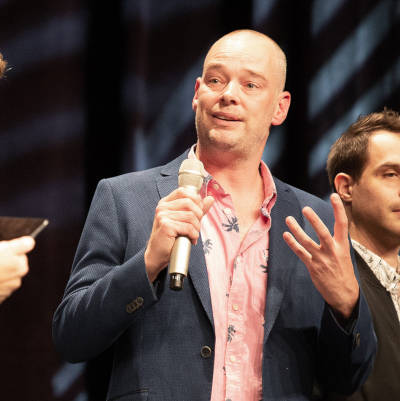
Tim Geurtjens (NL)
After a study mechanical engineering, Tim Geurtjens (1976) attended the Design Academy Eindhoven in 2003 where he graduated 4 years later. Since then he has been working as CTO for Joris Laarman Lab, best known for its experimental designs inspired by upcoming technology. Over the last 7 years he developed extensive knowledge of exotic materials and cutting edge technologies, specifically novel digital fabrication methods.
Tim is co-founder and Board Member of MX3D, a company that developed several large-scale 3D printers that use 6-axis industrial robots. These printers allow them to print very large structures in many different materials such as thermoset plastics, stainless steel or aluminium. MX3D is laying the last hand on their 3D-printed steel bridge over a canal in Amsterdam.
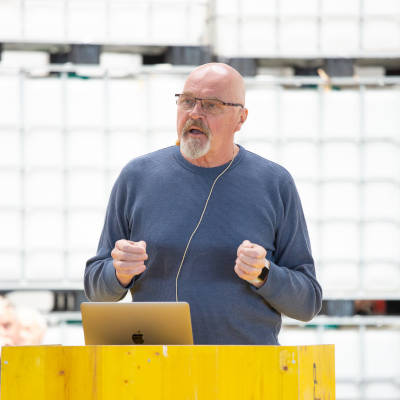
Dr. James K. Gimzewski (UK/US)
Dr. James K. Gimzewski is a professor of Chemistry at the University of California, Los Angeles and member of the California NanoSystems Institute. His current research includes STM and AFM of graphene and its nanomechanics, fabrication of atomic switch networks to emulate the neocortex and the mechanobiology of cells, exosomes and actin bound with neuronal binding proteins. Dr. Gimzewski is a Fellow of the Royal Society and Royal Academy of Engineering. He has received honorary Doctorates (DSc hc & PhD hc) from the University of Aix II in Marseille, France and from the University of Strathclyde, Glasgow. He was Principal Investigator & satellite co-director of the WPI program, MANA, at the National Institute of Materials Science (NIMS) in Tsukuba, Japan. He is currently Scientific director of the UCLA Art|Sci Center. Prior to joining the UCLA faculty in 2001, he was a group leader at IBM Zurich Research Laboratory, where he conducted research in nanoscale science and technology for more than 18 years. Dr. Gimzewski pioneered research on mechanical and electrical contacts with single atoms and molecules using scanning tunneling microscopy (STM).
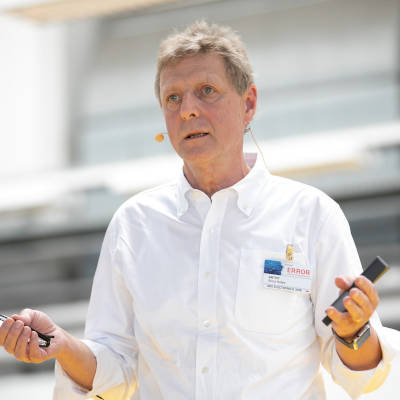
Ernst Hafen (CH)
Ernst Hafen is a geneticist and an advocate for citizens to gain control over the use of their personal data. Our medical and other personal data are locked in incompatible silos and citizens become increasingly dependent on multinational data companies (digital feudalism). Ernst posits the citizens should be enabled to store, aggregate and control sharing of their personal data in citizen-owned non-profit data cooperatives. He is the co-founder and president of the MIDATA cooperative in Switzerland.
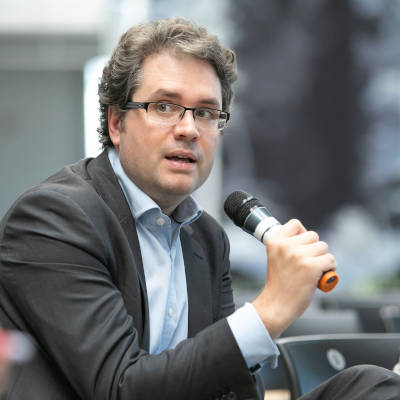
Eliot Ward Higgins (UK)
Eliot Ward Higgins is a British citizen journalist and blogger, known for using open sources and social media to investigate the Syrian Civil War, 2014–15 Russian military intervention in Ukraine and the downing of Malaysia Airlines Flight 17. He first gained mainstream media attention by identifying weapons in uploaded videos from the Syrian conflict.[1][2] He is the founder of Bellingcat, a website for citizen journalists to investigate current events using open-source information such as videos, maps and pictures.
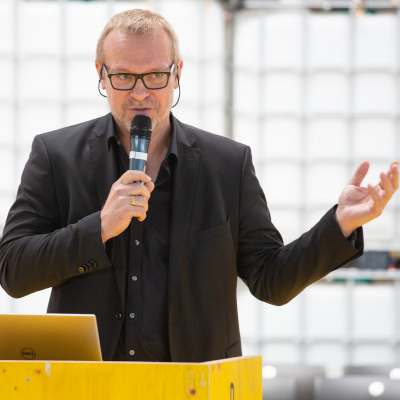
Horst Hörtner (AT)
Horst Hörtner is a media artist and researcher. He is expert in design of Human Computer Interaction and holds several patents in this field. He started to work in the field of media art in the 1980ies and co-founded the media art group x-space in Graz/Austria in 1990. Hörtner is founding member of the Ars Electronica Futurelab in 1996 and since then directing this atelier/laboratory. Since 2013, Horst Hörtner also holds a position as conjoint Professor at the University of Newcastle/Australia. He is working in the nexus of art & science and giving lectures and talks at numerous international conferences and universities.
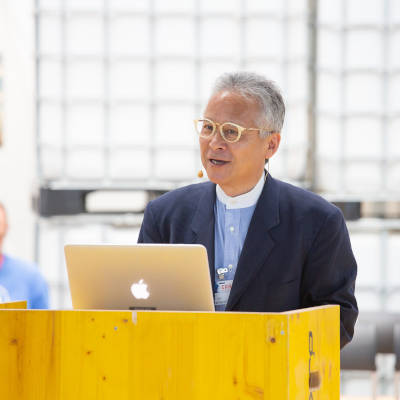
Hiroshi Ishii (US/JP)
Hiroshi Ishii is the Jerome B. Wiesner Professor of Media Arts and Sciences, at the MIT Media Lab. He joined the MIT Media Lab in 1995, and founded the Tangible Media Group, which he currently directs. Hiroshi’s research focuses upon the design of seamless interfaces between humans, digital information and the physical environment. His team seeks to change the “painted bits” of GUIs to “tangible bits” by giving physical form to digital information. In 2012, he presented the new vision Radical Atoms to take a leap beyond Tangible Bits by assuming a hypothetical generation of materials that can change form and appearance dynamically, becoming as reconfigurable as pixels on a screen.
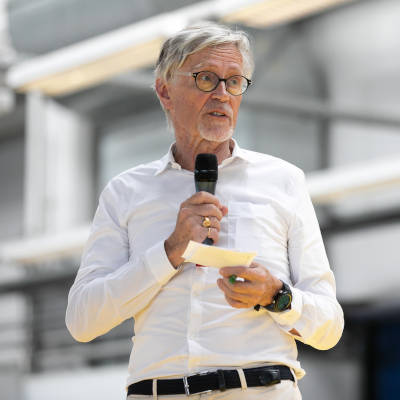
Derrick de Kerckhove (CA)
Derrick de Kerckhove is former Director of the McLuhan Program at the University of Toronto (1983-2008). Returning to Europe, he was professor at the university of Naples (2004-2014), Barcelona (2006-2015), and Visiting Professor in Ancona and now at Politecnico di Milano. Author of a dozen books in as many languages, he lives in Rome as scientific director of Media Duemila and Osservatorio TuttiMedia, his fields of research include Technopsychology, Neuro-cultural research, art and technology, Media Theory, Collaborative Educative Software, and Connected Intelligence.
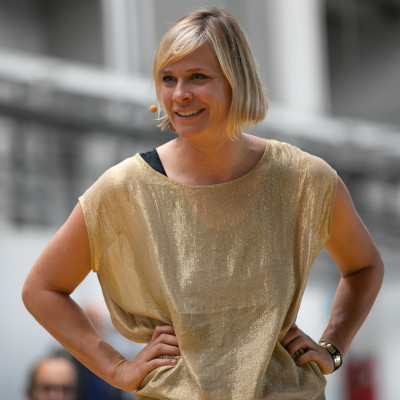
Sophie Lamparter (CH)
For the last 10 years Sophie has been building interdisciplinary networks and collaborations. She is the founder of DART, a testing lab bringing design, art, research, and technology together to build clever human machine interfaces. Before starting DART, she was Associate Director at swissnex San Francisco, Switzerland’s Innovation outpost in San Francisco. Her expertise is the digital creative industry. Being involved in scouting, presenting, match-making, scaling and funding of hundreds of projects and startups between Switzerland, Europe and the US, she knows it’s time for a new type of incubator dedicated to projects with an art and design focus.
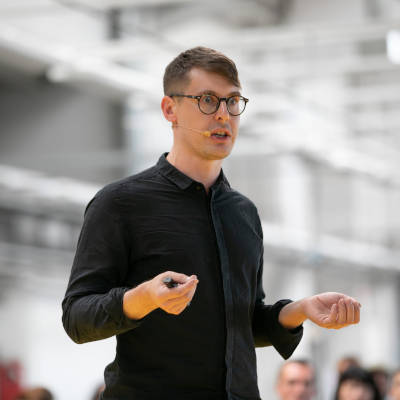
Leonhard Lass (AT)
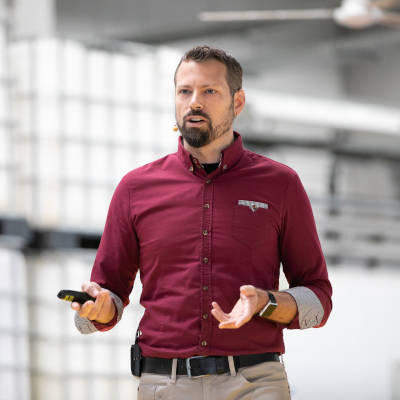
Nathan H. Lents (US)
Nathan H. Lents received a PhD in human physiology from Saint Louis University, postdoctoral training at New York University in computational biology, and has been on the faculty of John Jay College of The City University of New York since 2006. He has authored dozens of scientific articles, received research funding from a variety of federal agencies, has written two popular science books and many magazine articles, and maintains The Human Evolution Blog. He is also the host of the podcast, “This World of Humans.”
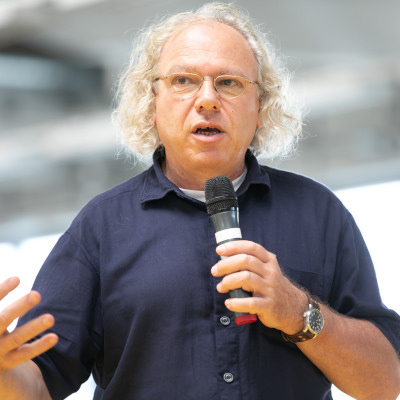
Alexander Mankowsky (DE)
Futures Studies & Ideation, Daimler AG
Alexander Mankowsky (DE) was born in Berlin in 1957 and studied social science, philosophy and psychology at Freie Universität Berlin. In 1989, he joined Daimler’s research institute in Berlin. The multidisciplinary approach of the Institute brought together a wide range of disciplines, from social sciences to artificial intelligence. His current work topics are future studies dealing with the constantly changing culture of mobility, the interdependence of social and technological innovation and other aspects in connection with possible paths into the future.
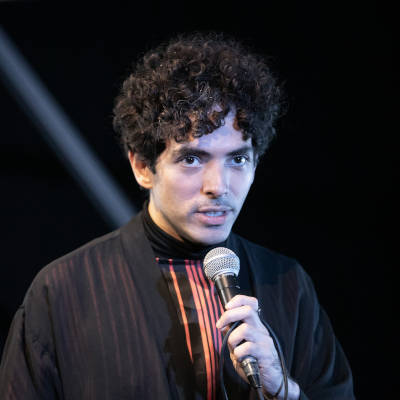
Nahum (MX/DE)
Nahum oeuvre goes deep into the human experience by challenging our perceptions through unusual perspectives. Navigating between the real and the imaginary, his work produces events that reframe the way we understand the world: “I am interested in that point where reality touches the impossible.“ He often employs outer space technologies, illusionism, hypnosis and music to guide audiences into otherworldly journeys to raise critical dialogues about the politics of existence. Nahum’s multidisciplinary work orchestrates a wide range of media including performance, installation, video, music, drawing and storytelling.
Nahum serves as the Chair for the Committee for the Cultural Utilisation of Space (ITACCUS), at the International Astronautical Federation (IAF) in Paris. In 2014, he was the first artist to be awarded the title of Young Space Leader for his unique cultural contributions to astronautics and space exploration. He is an International Space University alumnus and lecturer. Nahum is the Founding Director of KOSMICA, a global institute founded in 2011 with the mission to establish a platform for critical, cultural and poetic discourse on our relationship with outer space and the impact of space activities here on Earth.
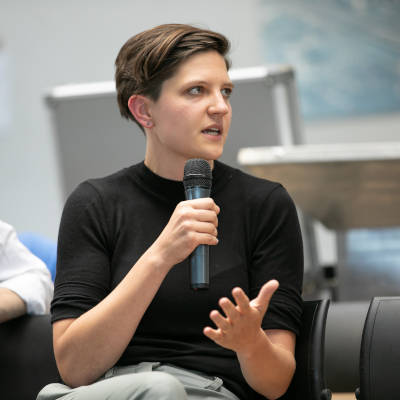
Simone C. Niquille (CH/NL)
Simone C. Niquille is a designer and researcher based in Amsterdam NL. Her practice Technoflesh investigates the representation of identity & the digitisation of biomass in the networked space of appearance. She holds a BFA in Graphic Design from Rhode Island School of Design and an MA in Visual Strategies from the Sandberg Instituut Amsterdam. She teaches Design Research at ArtEZ University of the Arts Arnhem. She is a 2016 Fellow of Het Nieuwe Instituut Rotterdam and is recipient of the talent development grant by The Creative Industries NL 2016/2017. SCN is commissioned contributor to the Dutch Pavilion at the 2018 Venice Architecture Biennale.
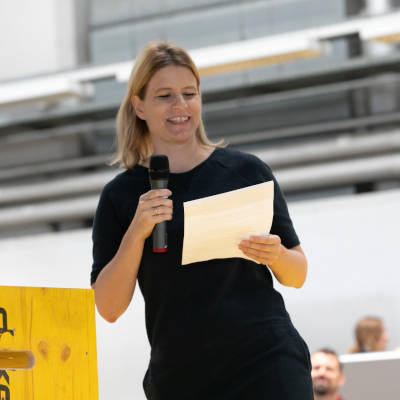
Barbara von Rechbach (AT)
Barbara von Rechbach, university assistant for design fiction at University of Arts and Design Linz (UFG), at the department for Technology & Design, guest professor at New Design University St. Pölten (NDU), lecturer for visual communication at UFG Linz and the University of Applied Science for Management & Communication Vienna. 2013-2017 award leader BA (Hons.) Graphic Design, Staffordshire University, UK. Lecturer and researcher for storytelling and media design at Berlin University of the Arts, University of Westminster, London, University of Applied Arts Vienna, et al.
Barbara is a creative director and works in exhibition design and narrative planning for clients in design and media. MA in Hypermedia Studies at the University of Westminster and Visual Media/Arts Education at the University of Applied Arts Vienna.
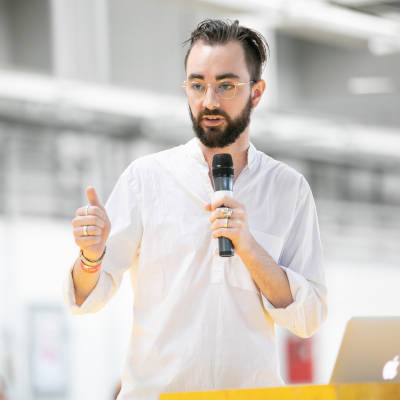
Tobias Revell (UK)
Tobias Revell is an artist and designer. Spanning different disciplines and media his work addresses the urgent need for critical engagement with material reality through design, art and technology. Recent work has looked at the idea of technology as a territory, expectations of the future, rendering software and the occult and supernatural in pop culture discussions of technology.
Tobias is Course Leader of MA Interaction Design Communication at the London College of Communication, UAL. He is a co-founder of research consultancy Strange Telemetry and one-half of research and curatorial project Haunted Machines who curated Impakt festival in 2017. He lectures and exhibits internationally, and has recently appeared at Improving Reality, FutureEverything, IMPAKT Utrecht, Web Directions Sydney, Transmediale Berlin, ThingsCon and Lift Geneva. He is a PhD candidate in design at Goldsmiths.
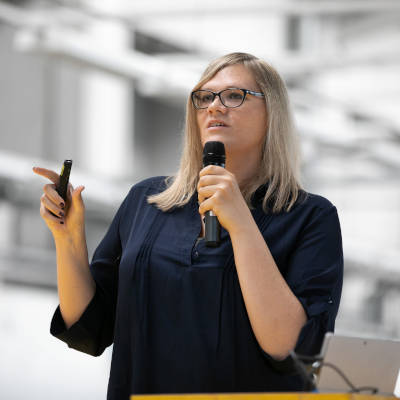
Regina Rini (US/CA)
Regina Rini teaches at York University in Toronto, where she is the Canada Research Chair in Philosophy of Moral and Social Cognition. She writes on topics at the intersection of philosophy and technology, including AI ethics, genetic engineering, and the role of social media in democratic debate. Her book on the ethics of microaggression will be published in 2019.
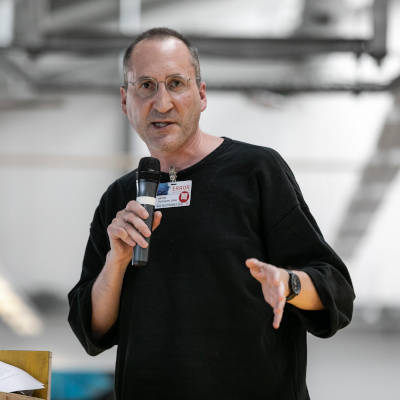
Chris Salter (CA)
Chris Salter is an artist, University Research Chair in New Media, Technology and the Senses at Concordia University and Co-Director of the Hexagram network for Research-Creation in Media Arts, Design, Technology and Digital Culture, in Montreal. Salter’s performances, installations, research and publications have been presented at numerous festivals, exhibition and conferences around the world. He is the author of Entangled (2010) and Alien Agency (2015) both from MIT Press.
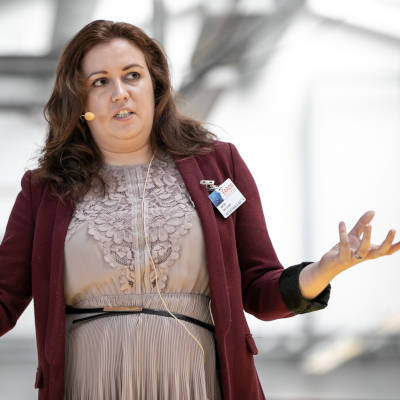
Beth Singler (UK)
Dr Beth Singler is a Research Associate at the Faraday Institute for Science and Religion, and is soon to become the Junior Research Fellow in Artificial Intelligence at Homerton College, Cambridge University. She is also an Associate Research Fellow at the Leverhulme Centre for the Future of Intelligence. She draws on anthropological fieldwork as well as research on contemporary narratives in order to explore the public understanding of AI and of what it might mean for our future.
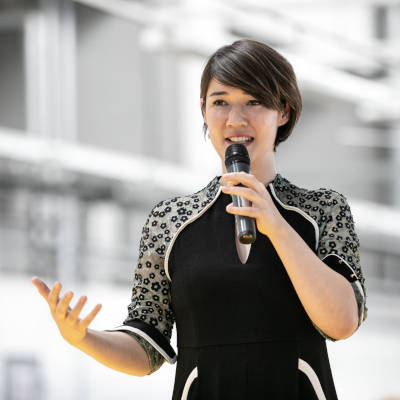
Sputniko! (JP)
Sputniko! creates film and multi-media installation works which explore the social and ethical implications of emerging technologies. From 2017, Sputniko! is an Associate Professor at the University of Tokyo where she is furthering her work with the Royal College of Art – IIS Design Lab. From 2013 to 2017, Sputniko! was an Assistant Professor at the MIT Media Lab, where she directed the Design Fiction research group. To date, she has had pieces included in the collections of museums such as the V&A and the 21st Century Museum of Contemporary Art, Kanazawa.
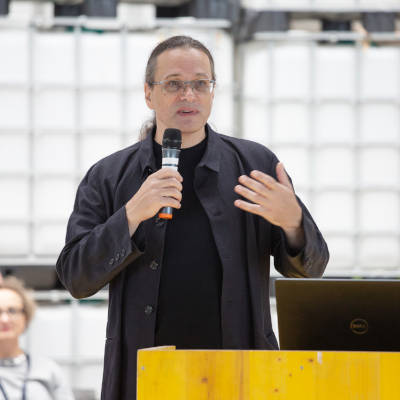
Gerfried Stocker (AT)
Gerfried Stocker is a media artist and telecommunications engineer. In 1991, he founded x-space, a team formed to carry out interdisciplinary projects, which went on to produce numerous installations and performances featuring elements of interaction, robotics and telecommunications. Since 1995, Gerfried Stocker has been artistic director of Ars Electronica. In 1995-96, he headed the crew of artists and technicians that developed the Ars Electronica Center’s pioneering new exhibition strategies and set up the facility’s in-house R&D department, the Ars Electronica Futurelab. He has been chiefly responsible for conceiving and implementing the series of international exhibitions that Ars Electronica has staged since 2004, and, beginning in 2005, for the planning and thematic repositioning of the new, expanded Ars Electronica Center, which opened its doors in January 2009.
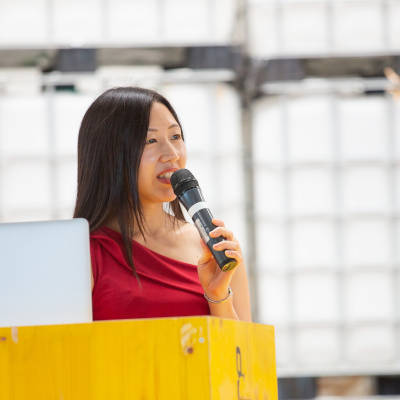
Yuri Tanaka (JP)
Yuri Tanaka; currently, a postdoctoral researcher at Tokyo University of the Arts while carrying out her collaborative project through her stay at CERN, a mediator within her research theme on cosmic art, an expert at the Committee for the Cultural Utilization of Space (ITACCUS) in the International Astronautical Federation (IAF), and the head of Cosmic Art Research Committee.
She was a researcher in residence at Futurelab in 2015. Her projects can be mostly found at public space or in an art festival.
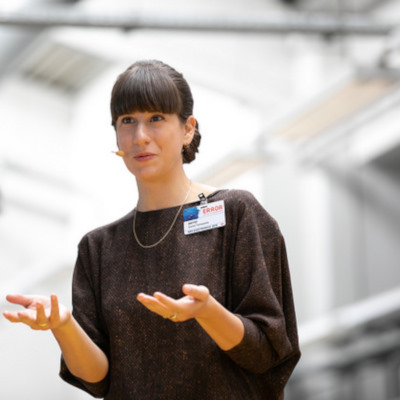
Giulia Tomasello (IT)
Giulia Tomasello is an Interaction Designer and Researcher specialised in wearables, biotechnology and material finishes for the female healthcare. She uses material research as a personal drive to question and communicate the boundaries between technology and human bodies, by developing experimental work in the intersection of medical and social sciences.
Giulia Tomasello gitomasello.com
Coded Bodies: codedbodies.persona.co
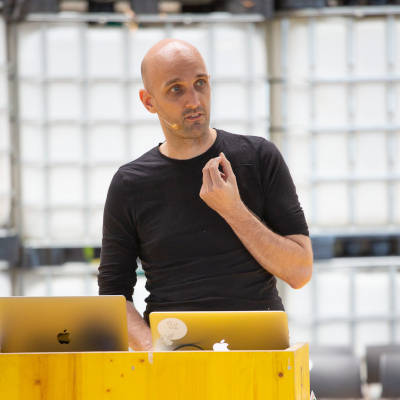
Miha Turšič (SI/NL)
Miha Turšič is an artist, designer and researcher, dedicated to the development of arts and humanities in outer space for more than ten years. He designed works about the human condition in outer space, developing post-gravitational art and artistic satellites, founded Cultural Centre of European Space Technologies (KSEVT), an institution with dedicated Cultural Space Programme and actively developing cooperations between space and art institutions in Europe, Russia, United States and China. In the last ten years, he organised a series of Out of the Cradle symposiums on the interdisciplinary understanding of human efforts in outer space, commissioned and curated pavilion of Republic of Slovenia at Architectural biennial in Venice (2014), produced a number of exhibitions on life in outer space and produced artworks for outer space conditions.
Currently, he works as project developer at Waag Society, where he develops projects for Open Design, Open Wetlab, art&science collaborations, space culturalisation and interdisciplinary composites.
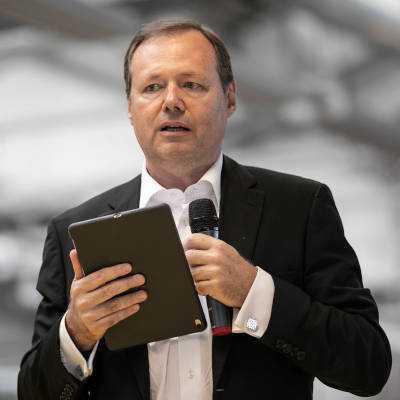
Roberto Viola (IT)
Roberto Viola is Director General of DG CONNECT (Directorate General of Communication, Networks, Content and Technology) at the European Commission. Before joining the EC, he held the position of Secretary General of AGCOM and various other positions including as Head of Telecommunication and Broadcasting Satellite Services at ESA. He served as Chairman of the European Radio Spectrum Policy group (RSPG).
Roberto Viola holds a Doctorate in Electronic Engineering and a MBA.
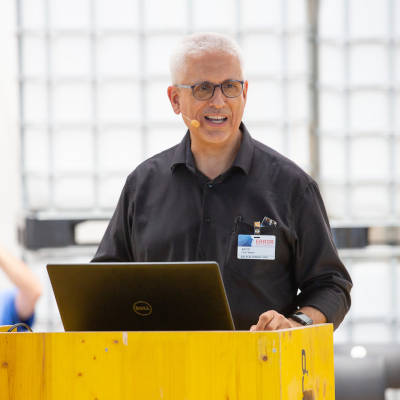
Chris Welch (UK)
Chris Welch is Professor of Space Engineering at the International Space University in Strasbourg, France. Although technically a physicist-turned-engineer, Chris sees himself more as a ‘spaceist’, interested in all aspects of space. Chris is a Vice-President of the International Astronautical Federation, a Fellow of the British Interplanetary Society (BIS), the Royal Aeronautical Society, and the Royal Astronomical Society. He is a trustee/board member of the BIS, the Spacelink Learning Foundation, and the Arts Catalyst, an advisor to the Moon Village Association and the Initiative for Interstellar Studies, and is Vice Chair of the World Space Week Association. Chris especially enjoys engaging with cultural, arts and design practitioners, wrote what he believes to be the first ever paper on the design of extraterrestrial gardens and currently has a poem orbiting on the International Space Station.
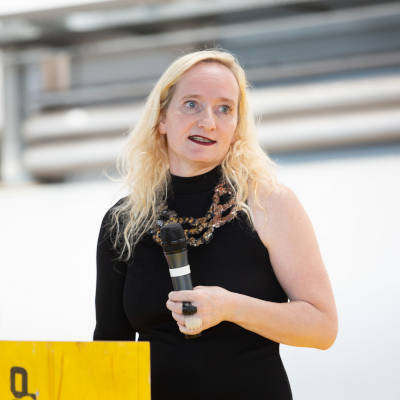
Eveline Wandl-Vogt (AT)
Eveline Wandl-Vogt, born 1969, Ischgl/Tyrol, is an experimentalist, network facilitator, cultural lexicographer and founder as well as coordinator of the Exploration Space (11.2017-), Methods and Innovation Working Group at the Austrian Academy of Sciences, Austrian Centre for Digital Humanities (ACDH). The working group is open to a creative combination of methods and practices of humanities, environmental studies and geography as well as art and design and is included as a best practice example of the German government’s Open Innovation Platform.
Eveline works as a research manager and expert in various international initiatives, especially in the field of technical and social research infrastructures (ADHO, DARIAH, ECSA, COST Actions, Open Knowledge, Standardization) and in 2018/19 as Research Affiliate at the Department for Romance Language and Literatures appointed.
Eveline has a multidisciplinary university background (German Philology, Geography, Theatre Studies, Education, Social Innovation) and experience in Knowledge Organization and Knowledge Creation, Digital Transformation, Data Curation, Design Thinking, Open Innovation in Science and Diversity Management.
She is an ambassador for Open Science, Challenge based Innovation and Open Innovation in Science.
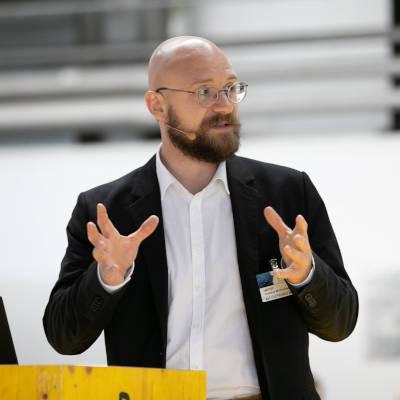
Andreas Wolfsteiner (DE)
Andreas Wolfsteiner, Priv.-Doz. Dr., currently teaches at the Department for Theatre, Film and Media Studies at the University of Vienna.
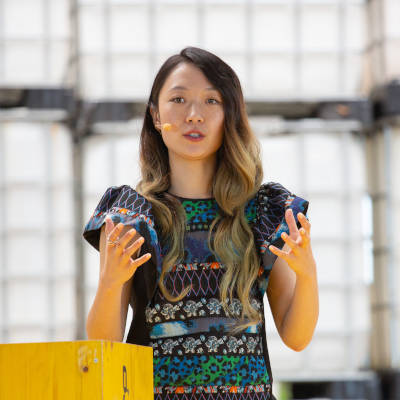
Xin Liu (CN/US)
Xin Liu is an artist and researcher whose practices range from performances, apparatus, installations to scientific experiments and academic papers. Xin is the Arts Curator in Space Exploration Initiative in MIT Media Lab and the recipient of the Van Lier Fellowship from Museum of Arts and Design and New INC membership from New Museum, NYC. Xin received awards in SXSW and FastCoDesign and has shown her work internationally at events and venues including Ars Electronica, Boston MFA, Sundance Film Festival, The Walker Art Center, OCAT Shanghai and ISEA.
